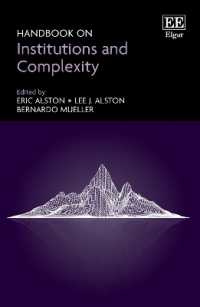Full Description
The number of severe and sometimes catastrophic disruptive events has been rapidly increasing. Extreme weather events including floods, wildfires, hurricanes, and other natural disasters have become both more frequent and more severe, whilst events such as the COVID-19 pandemic represent a global threat to public health with huge economic effects that recovery packages tried to address. These disruptive events, alone and in combination, have dramatic consequences on nature, human life, and the economy, calling for urgent action to mitigate their causes and adapt to their impacts.
In response to discourses of collapsology and end-of-growth theories, this monograph offers an analytical approach to developing legal responses that can help ensure the needs of present and future generations can be met through energy systems, infrastructure development, and natural resources management in these times of disruption. 'Resilience' is, therefore, seen as a common framework for the interpretation and development of energy, infrastructure, and natural resources law.
With a mix of thematic chapters and case studies from multiple jurisdictions, Resilience in Energy, Infrastructure, and Natural Resources Law maps and assesses legal responses to disruptive nature-based events, and examines possible legal pathways for more sustainable outcomes, based on its engagement with this concept of 'resilience' and social-ecological thinking.
Contents
Part I - Introduction
1: Catherine Banet, Hanri Mostert, LeRoy Paddock, Milton Fernando Montoya, and Iñigo del Guayo: Introduction
Part II - Defining Resilience in Energy, Infrastructure, and Natural Resources Law
2: Nigel Bankes, Lee Godden, and Íñigo del Guayo: The Role of Law in Fostering or Inhibiting Resilient Energy Systems
3: Catherine Redgwell: Building Resilience from the Top Down? The Role of International Law and Institutions
4: Catherine Banet: Planning for Resilience: Resilience as a Criterion in Energy, Climate, Natural Resources, and Spatial Planning Law
5: Martha M. Roggenkamp: Resilient Energy Systems in the European Union: Critical Infrastructures and Cybersecurity Regulation
6: Alexandra B. Klass and Isaac Foote: Building Resilience into U.S. Energy Transport Infrastructure
Part III - State Legal Response to Disruption
7: Hao Zhang: Resilience and Energy Law in China in an Era of Energy Decarbonisation
8: Lee Godden: Law, Resilience, and Natural Disaster Management in Australia: The 'Bushfire Summer' and Critical Energy Networks
9: Damilola Olawuyi: Advancing Resilience to Price Volatility in Oil and Gas Markets: Current Challenges and Ways Forward in the MENA Region
10: Milton Fernando Montoya and Daniela Aguilar Abaunza: Reaction from Public Policy and Regulation after COVID-19 Crisis in Latin America: The Cases of Colombia and Peru in Mining and Electrical Industry
11: José Juan González Márquez: The New Nationalism of the Mexican Energy Policy in a Turbulent International Context
12: Don C. Smith and Donald N. Zillman: Energy Resilience in the United States: Impact of the 2020 Presidential and Congressional Elections
Part IV - Project Developers Legal Response to Disruption
13: Anatole Boute: Force Majeure and the COVID-19 Energy Market Crash: Lessons for the Peak Oil Era
14: Alastair R. Lucas: Extreme Natural Event Impacts on the Energy Sector and its Regulation: Canada and North America
15: LeRoy Paddock: Creating a Framework that Supports Resilient Renewable Energy Generation
Part V - Strategic Financing and Economic Responses to Disruption
16: Nadia Ahmad: Transnational Energy Law Regimes and Systems Dynamics: Calibrating Finance Mechanisms of the International Renewable Energy Agency and the Energy Charter Treaty
17: Hanri Mostert, Chris Adomako-Kwakye, Kangwa-Musole Chisanga, and Meyer Van den Berg: How Strong Can You Stand if You're on Your Knees? Financing Crises in Africa: Implications for the Natural Resource and Energy Sectors
18: Hans Jacob Bull: Natural Damage Insurance: An Instrument for Economic Resilience
19: Piti Eiamchamroonlarp: Public-Private Partnership in the Reconstruction of the Energy Sector: The Case for EV Buses in Thailand
Part VI - Managing Disruption and Resilience at Consumption Level: Access to Energy, Demand Response, Equity
20: Barry Barton: Building Resilience from the Ground Up: Local Supply and Demand Management with Renewables, Prosumers, Energy Efficiency, Critical Minerals, and the Circular Economy
21: Louis de Fontenelle: Increasing the Resilience of the Energy System Through Consumers: Towards Decentralised, Interconnected and Supportive Ecosystems
Part VII - Conclusion
22: Catherine Banet, Hanri Mostert, LeRoy Paddock, Milton Fernando Montoya, and Iñigo del Guayo: Conclusion - Managing Disruption and Reinventing the Future: Resilience as Requirement for Legal Frameworks







